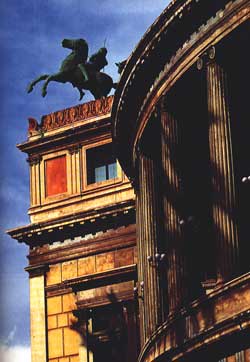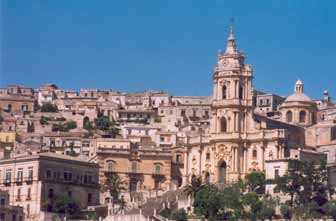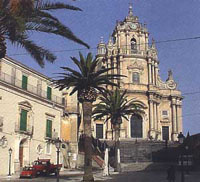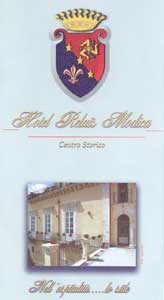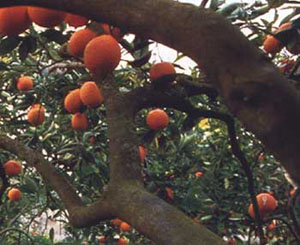 Chocotravels
presents a unique travel that ties together the architectural beauties
of the Sicily in the XVII century with the fragrances and the flavours
of this enchanted land.
Chocotravels
presents a unique travel that ties together the architectural beauties
of the Sicily in the XVII century with the fragrances and the flavours
of this enchanted land.
From Palermo to Catania, from Modica to Ragusa and Noto following the
sparkling scene of the baroque style we'll be surrounded by the incredible
landscape of this island where the green, the red and the yellow of the
country melt with the dark blue of the sea. And then we'll taste a lot
of flavours never tested before or perhaps forgotten for a long time,
in a world where history and legends still live together as the famous
Modica's chocolate. Here, in this nice small town near the sea, the Aztec
tradition lives again thanks to Franco and Paolo Ruta from the "Antica
Dolceria Bonajuto" and to many other artisans that maintain the secret
of this ancient recipe brought to them by the Spanish domination.
TOUR PROGRAM:
|
|
1°day:
arrival at Palermo airport in the morning. Transfer by private
bus to "Vucciria" the colourfully market so picturesque
that resembles an Arabian souk. Palermo, in the 827 A.C was an important
Islamic commercial centre. Lunch in a typical restaurant nearby
the market. Following, guided tour to the main interesting baroque
places in the town as Piazza Vigliena with its marvellous Palaces
and San Giuseppe, SS Salvatore and Santa Caterina churches. In the
evening accommodation in the reserved Hotel **** and dining free. |
| 2°day:
breakfast in Hotel and transfer to Acireale, near Catania.
In the XVIII century it was one of the most important cultural centre
of the whole island and there are wonderful examples of the famous
"flourished" Sicilian baroque. But before leaving Acireale
we cannot miss to taste an incredible ice cream really handmade
following ancient recipes: once it was made with the snow of the
Etna Volcano. Then we'll continue our travel to Catania,
situated among the golden shores of the Ionian Sea, the Etna (the
biggest volcano in Europe) and the green, fertile land crossed by
the Simeto River. This town was completely rebuilt after a terrible
earthquake in 1693 so its architectural aspects are very interesting.
Guided tour: we'll visit Via Crociferi that with its Churches and
its Palaces proposes us the "flourished" Catania's baroque;
Palazzo Biscari, full of putti and flours, the Benedictine's Monastery
and the Cathedral devoted to Sant'Anna. We can't forget the true
symbol of Catania: "U liotru", a basaltic elephant
with an Egyptian obelisque on the shoulders built in 1736. Following we'll reach Modica: accommodation in Hotel ***. Dinner in a typical restaurant with a …….chocolate menu! |
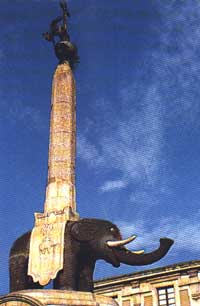 |
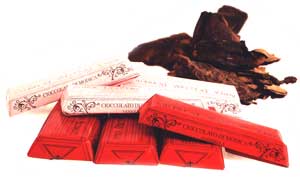 3°
day: breakfast in hotel. At about 9.30 A.M we'll reach the "Antica
Dolceria Bonajuto" where Franco Ruta will keep a charming lesson
about the Modican Chocolate, true "food of gods" because it
is still prepared following the ancient Aztec tradition. "The
history of our chocolate winds along a same road, that going back to the
past, joins the Sicily, especially the country ofModica, the Spain
and finally refinds its roots in the splendid civilization of the Aztecs,
old population of Mexico. The discovery of America allowed the Spaniards
to know a great variety of food-stuffs, such as the "Xoco'atl",
a product extracted from cacao seeds, kept carefully by the people. The
term Xoco'atl indicated a drink and a solid product too. As for the latter,
the first distinction had been made by brother Bernardino de Sahagun,
who for the first time used the masculin "Cioccolato" pointing
out that cigar shaped product that Aztecs obtained by grinding tha cacao
seeds on tool called "metatl" (a round stone resting on two
cross-bases), using a special stone "matterello". The so obtained
cacao meal was mixed with cooked maize flour; the whole was rubbed on
the "metatl" till the cocoa-butter had hardened the blend. The
Spaniards during their domination, introduced the working of the chocolate,
as well as they had learned by the old aztecs. This chocolate contrarily
to what happened in the rest or Europe did never pass to an industrial
phase, remaining unchanged over the centuries. Up to present the Bonajuto
Old Pastry produces the chocolate with the same ".
3°
day: breakfast in hotel. At about 9.30 A.M we'll reach the "Antica
Dolceria Bonajuto" where Franco Ruta will keep a charming lesson
about the Modican Chocolate, true "food of gods" because it
is still prepared following the ancient Aztec tradition. "The
history of our chocolate winds along a same road, that going back to the
past, joins the Sicily, especially the country ofModica, the Spain
and finally refinds its roots in the splendid civilization of the Aztecs,
old population of Mexico. The discovery of America allowed the Spaniards
to know a great variety of food-stuffs, such as the "Xoco'atl",
a product extracted from cacao seeds, kept carefully by the people. The
term Xoco'atl indicated a drink and a solid product too. As for the latter,
the first distinction had been made by brother Bernardino de Sahagun,
who for the first time used the masculin "Cioccolato" pointing
out that cigar shaped product that Aztecs obtained by grinding tha cacao
seeds on tool called "metatl" (a round stone resting on two
cross-bases), using a special stone "matterello". The so obtained
cacao meal was mixed with cooked maize flour; the whole was rubbed on
the "metatl" till the cocoa-butter had hardened the blend. The
Spaniards during their domination, introduced the working of the chocolate,
as well as they had learned by the old aztecs. This chocolate contrarily
to what happened in the rest or Europe did never pass to an industrial
phase, remaining unchanged over the centuries. Up to present the Bonajuto
Old Pastry produces the chocolate with the same ".
Then we'll visit his workshop to discover the secrets of this incredible
product and later he will propose us how to taste his chocolate. For lunch
we suggest you to go and try some specialities of this country because
Arabian and Spanish cooking are melted together with local products. There
is a great variety of appetisers made of the famous DOP cheese from Ragusa
or of sausages and olives. And don't forget the starts as the wonderful
"minestroni"(vegetable soup) with lentils, broad beans and chick
pea. For the meat lovers we suggest to taste the rabbit "a stimpirita",
the pork "alla normanna" and the "Mpanatigghia"
(in Spain it is called "Empanadilla") a cake with meat, almonds
and chocolate. In the afternoon guided visit to the "Bottega del
Dolciere" rebuilt with ancient instruments for preparing chocolate
as the famous "metate". Time at disposal for shopping and visiting
the house where Salvatore Quasimodo, the famous Sicilian Nobel poet was
born. In the evening dining at Frigintini: for a particular appetiser
we'll go to Aldo Puglisi's, a young pastry maker for tasting his interesting
creations: the "Ciokarrube" pralines made with carob flavour.
Overnight in Hotel.
|
||||
| 5°
day: breakfast in Hotel and transfer to the interesting archaeologic
site of Cava Ispica, something like a canyon 10 Kilometres
long where many testimonials of Roman, Greek, Byzantine, Arabian
and Norman dominations were found. Then we suggest following a rural itinerary because this particular zone is famous for carrots, tomatoes and carrube: do you know that the carob flavour is largely used in pastry thanks to its particular chocolate taste? Visit to a characteristic "masseria iblea" (a sort of farm) to eat the famous warm "ricotta" ( a typical Italian cheese). . |
||||
|
||||
| In the afternoon transfer
to Ragusa Ibla, the ancient part of Ragusa completely rebuilt
in the baroque style at the end of 1600. You can't loose this incredible
visit with all the sparkling Palaces and the rich Churches that sign
an important period in the Italian art. Dining in a typical restaurant
and a fantastic ice cream at "Gelati Di Vini" will crown
our night. |
||||
|
||||
|
||||
